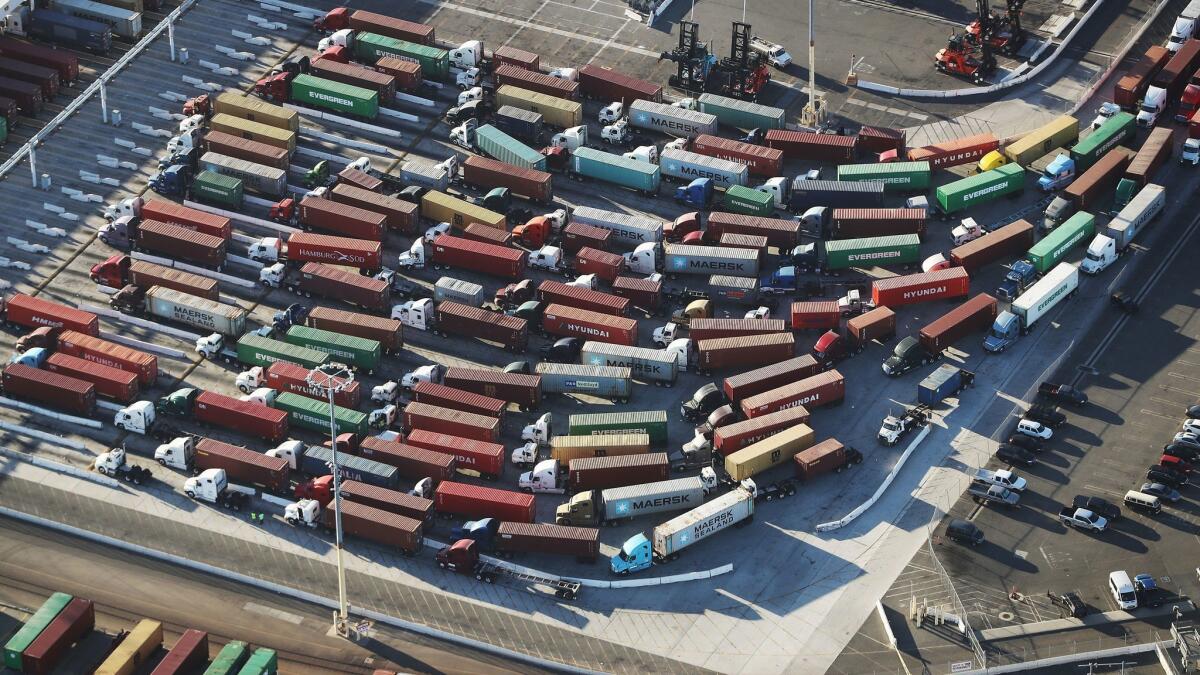L.A. and Long Beach port workers plan strike starting Monday

- Share via
Warehouse workers and truck drivers at the ports of Los Angeles and Long Beach are planning to launch a three-day strike Monday, aiming to put pressure on logistics companies they claim owe them back wages.
The action targets XPO Logistics Inc. and NFI Industries and marks the 16th strike mounted by the Teamsters union in recent years among nonunion workers at the twin ports, according to the labor group. The strikers plan to concentrate picketing and distributing leaflets Monday and Tuesday at warehouses, headquarters and retail outlets of clients of XPO and NFI, as well as demonstrating at the port itself.
Under a new law, retailers share liability for misclassified truck drivers at California ports »
The strike is labor groups’ latest effort to focus on workers that companies don’t consider direct employees, or who get their paychecks from other firms in the supply chain. It also exemplifies how strikes in the United States have shifted toward drawing public scrutiny to corporate behavior and workers’ demands — such as the union-backed “Fight for $15” minimum wage — rather than directly disrupting companies’ bottom lines.
Port officials have said that previous Teamster port strikes led to some shipments being turned away but had a limited effect on port operations.
‘We work for them’
The union hopes its mobilizations next week will heighten public pressure on the logistics firms and on their prominent clients, which the Teamsters said include Amazon.com Inc., Toyota Motor Corp., Puma and Rio Tinto.
“At the end of the day, we work for them too — we carry their cargo, so we want them to support us,” XPO Logistics driver Cesar Rodriguez said.
The strike escalates a long-running dispute between organized labor and the logistics companies that has helped draw local and federal scrutiny to XPO and NFI. Workers have argued that the companies wrongly classify them as independent contractors. Because of the amount of control the companies exercise over them, the workers say they should legally be considered employees with the right to unionize and to be paid at least minimum wage.
The strikers also plan to focus on immigration issues. On Wednesday, they plan to join up with other labor and liberal groups for demonstrations focused on temporary protected status, a humanitarian policy that helps people from countries in perilous conditions live and work in the United States. President Trump has ordered the status revoked over the next two years for immigrants from countries including El Salvador, Honduras and Nepal, which could lead to those people being deported.
Drivers hope their absence from work will underscore the issue’s urgency in the eyes of companies and Congress; they are urging lawmakers to pass legislation to protect them But that looks like an uphill battle as long as the presidency and Congress remain under Republican control.
More to Read
Inside the business of entertainment
The Wide Shot brings you news, analysis and insights on everything from streaming wars to production — and what it all means for the future.
You may occasionally receive promotional content from the Los Angeles Times.










